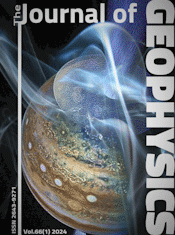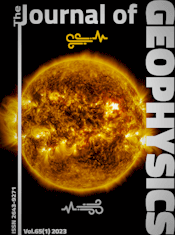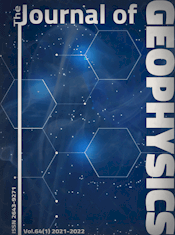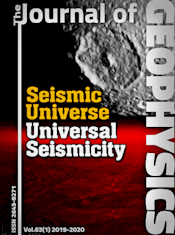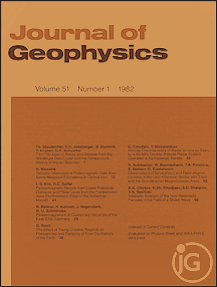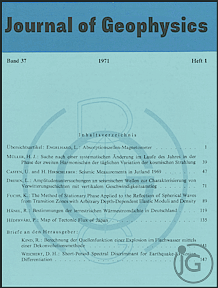Magnetic expression of the continent-ocean boundary between the western margin of Australia and the eastern Indian Ocean
Article Sidebar
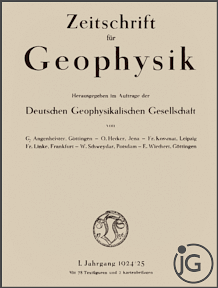
Vols. 1-18 (1924-1944), ISSN 0044-2801
Main Article Content
Abstract
A comprehensive review of the Early Cretaceous seafloor-spreading magnetic anomalies (M0 to M10) in the eastern Indian Ocean leads to the isolation of a distinctive magnetic anomaly at the continent-ocean boundary (COB). This anomaly is traceable 2000 km southward from the rifted margin of the magnetically smooth central Exmouth Plateau, through the transform-faulted and rifted margins of the Cuvier Abyssal Plain and Carnarvon Terrace and the set of narrow spreading segments south of the Zenith-Wallaby Fracture Zone to the area west of Perth. The anomaly corresponds to the COB as indicated by: 1. the lower part of the continental slope in a mean water depth of 3.75 km for the rifted margin and 4.5 km for the transform-faulted margin and 2. a change in seismic-reflection character from the faulted breakup unconformity on the continent to the smooth but hyperbolic oceanic layer 2. The COB anomaly at the rifted margin is modelled by modifying the magnetization of the oldest oceanic block of the seafloor-spreading sequence adjacent to the continental crust; in places, the COB anomaly is flanked by smaller anomalies modelled as rift-related dykes in the adjacent continental crust. The amplitude of the COB anomaly, commonly twice or more that of the adjacent oceanic magnetic anomalies, is due either to a thicker or a more intensely magnetized source. The COB anomaly at the transform-faulted margin is modelled by a thick vertical body that extends 10 km seaward of the COB. The Wallaby Plateau is probably underlain by oceanic crust, as shown by the continuity of the abandoned spreading ridge of the Sonne Ridge southwestward from the Cuvier Abyssal Plain; the shape of the Wallaby Plateau and the volcanic composition of dredge-hauls indicate that it is probably a volcanic upgrowth of the oceanic crust as exemplified by Iceland today. Furthermore, like lceland, the Wallaby Plateau is crossed by magnetic anomalies that are possibly degraded seafloor-spreading anomalies. The Zenith Plateau lacks magnetic lineations and its crustal structure, like that of the Naturaliste Plateau to the south remains unknown.
 ARK: https://n2t.net/ark:/88439/y098447
ARK: https://n2t.net/ark:/88439/y098447
Permalink: https://geophysicsjournal.com/article/239
Article Details
References
Coleman, P.J., Michael, P.J., Mutter, J.C. (1982) The origin of the Naturaliste Plateau, SE indian Ocean: implications from dredged basalts. Geol. Soc. Aust. J. 29:457-468
Dalrymple, G.B. (1979) Critical tables for the conversion of K-Ar ages to new constants. Geology 7:558-560
Davies, T.A., Luyendyk, B.P., et al. (1973) Initial reports of the Deep Sea Drilling Project, 26. U.S. Govt. Printing Office, Washington
Embleton, B.J.J. (1984) Continental palaeomagnetism. In: Veevers, J.J. (Ed.) Phanerozoic Earth history of Australia, pp. 11-16. Oxford University Press
Exon, N.F., Willcox, J.B. (1980) The Exmouth Plateau: stratigraphy, structure, and petroleum potential. Aust., Bur. Miner. Resour., Geol. Geophys., Bull. 199
Exon, N.F., von Rad, U., von Stackelberg, U. (1982) The geological development of the passive margins of the Exmouth Plateau off northwest Australia. Marine Geol. 47:131-152
Falvey, D.A. (1972a) Sea-floor spreading in the Wharton Basin (northeast Indian Ocean) and the breakup of eastern Gondwanaland. Aust. Pet. Expl. Assoc. J. 12:86-88
Falvey, D.A. (1972b) The nature and origin of m~rginal plateaux and adjacent ocean basins off northern Austraha. Ph.D. thesis, University of N.S.W.
Falvey, D.A., Veevers, J.J. (1974) Physiography of the Exmouth and Scott Plateaus, Western Australia, and adjacent Wharton Basin. Marine Geol. 17:21-59
Fisher, R.L. (1982) General bathymetric chart of the oceans (GEBCO), Sheet 5.09, 5th Edn. Canad. Hydro. Service. Ottawa
Hawkins, L.V., Hennion, J.F., Nafe, J.E., Thyer, R.F. (1965) Geophysical investigations in the area of the Perth Basin, Western Australia. Geophysics 30:1026-1052
Heezen, B.C., Tharp, M. (1966) Physiography of the Indian Ocean. Philos. Trans. R. Soc. London, Ser. A: 259:137-149
Heirtzler, J.R., Cameron, P., Cook, P.J., Powell, T., Roeser, H.A., Sukardi, S., Veevers, J.J. (1978) The Argo Abyssal Plain. Earth Planet. Sci. Lett. 41:21-31
Hinz, K. (1981) A hypothesis on terrestrial catastrophes: wedges of very thick oceanward dipping layers beneath passive contmental margins. Geol. Jahrb., Ser. E, 22:3-28
Johnson, B.D., Veevers, J.J. (1984) Oceanic palaeomagnetism. In: Veevers, J.J. (Ed.) Phanerozoic Earth history of Australia, pp. 17-38. Oxford University Press
Johnson, B.D., Powell, C.McA., Veevers, J.J. (1980) Early spreading history of the Indian Ocean between India and Australia. Earth Planet. Sci. Lett. 47:131-143
Larson, R.L. (1977) Early Cretaceous breakup of Gondwanaland off Western Australia. Geology 5:57-60
Larson, R.L., Hilde, T.W.C. (1975) A revised time scale of magnetic anomalies for the Early Cretaceous and Late Jurassic. J. Geophys. Res. 80:2586-2594
Larson, R.L., Carpenter, G.B., Diebold, J.B. (1978) A geophysical study of the Wharton Basin near the Investigator Fracture Zone. J. Geophys. Res. 83:773-782
Larson, R.L., Mutter, J.C., Diebold, J.B., Carpenter, G.B., Symonds, P. (1979) Cuvier Basin: a product of ocean crust formation by Early Cretaceous rifting off Western Australia. Earth Planet. Sci. Lett. 45:105-114
Marki, R.G. (1974a) Bathymetry, sediment distribution, and sea-floor spreading history of the southern Wharton Basin, eastern Indian Ocean. Ph.D. thesis, Univ. Connecticut
Marki, R.G. (1974b) Evidence for the breakup of eastern Gondwanaland by the Early Cretaceous. Nature 251:196-199
Marki, R.G. (1978a) Further evidence for the Early Cretaceous breakup of Gondwanaland off southwestern Australia. Marine Geol. 26:41-48
Marki, R.G. (1978b) Basement morphology and rift geometry near the former junction of India, Australia and Antarctica. Earth Planet. Sci. Lett. 39:211-225
Morgan, R. (1980) Eustasy in the Australian Early and Middle Cretaceous. N.S.W., Geol. Surv., Bull. 27
Mutter J.C. Talwani, M., Stoffa, P.L. (1982) Origin of seaward-dipping reflector; in oceanic crust off the Norwegian margin by "subaerial sea-floor spreading". Geology 10:353-357
Nunns, A.G., Talwani, M., Lorentzen, G.R., Vogt, P.R., Sigurgeirsson, T., Kristjansson, L., Larsen, H.C., Voppel, D. (1983) Magnetic anomalies over Iceland and surrounding seas. In: Bott, M.H.P., Saxov, S., Talwani, M., Thiede, J. (Eds.) Structure and development of the Greenland-Scotland Ridge, pp. 661-678. Plenum Press, New York
Petkovic, J.J. (1975) Whitworth, R.: Problems in secular variation in the Australian region. EOS 56:547-548
Powell, T.S. (1978) The sea-floor spreading history of the eastern Indian Ocean. M.A. thesis, Univ. California, Santa Barbara
Powell, T.S., Luyendyk, B.P. (1982) The sea-floor spreading history of the eastern Indian Ocean. Marine Geophys. Res. 5:225-247
Rabinowitz, P.D. (1976) Geophysical study of the continental margin of southern Africa. Bull. Geol. Soc. Amer. 87:1643-1653
Roots, W.D., Veevers, J.J., Clowes, D.F. (1979) Lithospheric model with thick oceanic crust at the continental boundary: a mechanism for shallow spreading ridges in young oceans. Earth Planet. Sci. Lett. 43:417-433
Rutten, K. (1975) Two-dimensionality of magnetic anomalies over Iceland and Reykjanes Ridge, Marine Geophys. Res. 2:243-263
Serson, P.H., Hannaford, W., Haines, G.V. (1968) Magnetic anomalies over Iceland. Science 162:355-357
Symonds, P.A., Cameron, P.J. (1977) The structure and stratigraphy of the Carnarvon Terrace and Wallaby Plateau. Aust. Pet. Expl. Assoc. J. 17:30-41
Talwani, M., Windisch, C.C., Langseth, M.G. (1971) Reykjanes Ridge crest: a detailed geophysical study. J. Geophys. Res. 76:473-517
Talwani, M., Eldholm, O. (1973) Boundary between continental and oceanic crust at the margin of rifted continents. Nature 241:325-330
Tomoda, Y., Ozawa, K., Segawa, J. (1968) Measurements of gravity and magnetic field on board a cruising vessel. Bull. Ocean Res. Inst. Univ. Tokyo 3:1-170
Veevers, J.J., Cotterill, D. (1978) Western margin of Australia: evolution of a rifted arch system. Bull. Geol. Soc. Amer 89:337-355
Veevers, J.J., Heirtzler, J.R. et al. (1974) Initial reports of the Deep Sea Drilling Project, 27. U.S. Govt Printing Office, Washington
Veevers, J.J., Tayton, J.W., Johnson, B.D. (1985) Promment magnetic anomaly along the continent-ocean boundary between the northwestern margin of Australia (Exmouth and Scott Plateaus) and the Argo Abyssal Plain. Earth Planet. Sci. Lett. (In press)
von Rad, U., Exon, N.F. (1983) Mesozoic-Cenozoic sedimentary and volcanic evolution of the starved passive margin off northwest Australia. Amer Assoc. Pet. Geol., Mero. 34:253-281
von Stackelberg, U., Exon, N.F., von Rad, U., Quilty, P., Shafik, S., Beiersdorf, H., Seibertz, E., Veevers, J.J. (1980) Geology of the Exmouth and Wallaby Plateaus off northwest Australia: sampling of seismic sequences. BMR J. Aust. Geol. Geophys. 5:113-140
Willcox, J.B. (1977) Some gravity models of the continental margin in the Australian region. Bull. Aust. Soc. Expl. Geophys. 8:118-124



